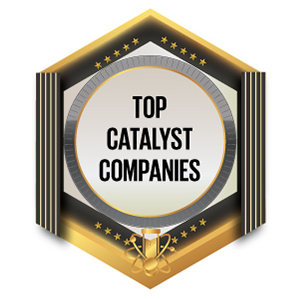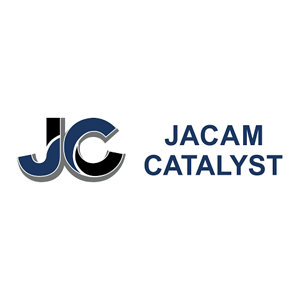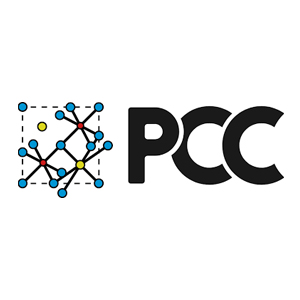\\\\ Top Catalyst Companies \\\\
\\\\\\\\\\ Top Catalyst Companies \\\\\\\\\\
-
Zeolyst International
Zeolyst International is a global leader in the design, manufacture, and supply of specialty zeolite powders, catalysts, and adsorbents. Serving refining, petrochemicals, emission controls, and renewable fuels, Zeolyst enables cleaner energy, higher yields, and sustainability through customer-focused innovation, advanced material science, and technical partnership since 1988.
-
Applied Catalysts
Applied Catalysts is a vertically integrated catalyst technology and manufacturing company supporting the Industrial Air Pollution Control, Chemical Process, and Specialty Catalyst Industries. Its catalyst development and applications testing laboratory exists to help customers by developing new products and supporting products in the field.
-
Jacam Catalyst
Jacam Catalyst is the leading innovative manufacturer and full-service chemical provider of oilfield chemicals, known for its highest customer loyalty. It happily serves customers from more than 50 locations across the U.S., and has established a rapidly expanding presence across North America.
More in News
Ways to Improve Operations in Chemical Businesses
Friday, February 27, 2026
Fremont, CA: Chemical manufacturing is a complex and ever-evolving industry that creates diverse products for many uses, such as pharmaceuticals, plastics, and food items. Although this sector can be highly lucrative, it also presents significant challenges regarding safety and operational efficiency.. Here are the top two operational difficulties that chemical businesses encounter and their alternatives. Load Optimization Another problem in the chemical supply chain is optimizing truck loadings. Load optimization is challenging, if not impossible, in the chemical sector since just-in-time (JIT) inventory systems are so prevalent. When selecting how to fill a truck with product orders, chemical manufacturers must consider the number of items required for each customer and the weight constraints and ADRs required by shipping carriers on an ongoing basis. Bulk shipments should always be prepared ahead of time to save money on transportation costs and improve chemical performance. Furthermore, ERP software or artificial intelligence (AI) can assist with freight loads and inventory management. AI can discover new data to improve chemical supply chain manufacturing and logistics. Planning Production Chemical providers must carefully plan production since chemical manufacturing is a multi-step, complex process. They must understand the components they will be using, such as the chemical substances that will function as reactants, solvents, or launching materials, which chemical products will be required for downstream manufacturing processes, where these chemical products are located throughout the supply line (i.e., how far along is each product); what supplies are available, and how much of those chemicals should be used in this specific plant. Chemical companies rely significantly on information technology (IT) skills such as enterprise resource planning (ERP) to correctly manage this complexity. However, ERPs struggle to keep up with the frequently changing state of affairs in chemical manufacturing without AI advancements. Chemical suppliers can optimize planning production schedules, make intelligent choices to identify market shifts and provide products that meet demand while optimizing productivity across all supply chain stages thanks to AI-enhanced chemical supply chain administration with advanced analytics.
Qualities of an Effective Chemical Consultant
Thursday, February 26, 2026
Fremont, CA: Chemical consultants play an increasingly crucial role as the chemical production industry faces new difficulties, such as fierce market rivalry, environmental concerns, safety rules, and shifting consumer behavior. Chemical industry consultants assist businesses in remaining competitive by spotting new trends, technologies, and best practices to improve operations. They help organizations navigate complicated regulatory obligations, ensuring they meet safety and environmental standards while being profitable. Here are some benefits of hiring a chemical consultant: Increased Efficiency Chemical consultants contribute extensive expertise and experience to the business. They may assist in optimizing operations by analyzing production processes and suggesting areas for improvement, resulting in cost savings and increased efficiency. Market Intelligence Chemical consultants may provide vital market insights and keep the industry up to speed on the latest trends and technology. They can also help discover growth possibilities and provide tactics for entering new markets. Compliance with Regulations and Standards Chemical consultants may provide vital market insights and keep the industry up to speed on the latest trends and technology. They can also help discover growth possibilities and provide tactics for entering new markets. Quality Control Quality control is crucial in the chemical manufacturing business, and experts can assist you in establishing and maintaining effective quality control systems. Implementing quality control procedures ensures that your goods meet the greatest quality, dependability, and safety levels. Risk Mitigation Chemical manufacturing carries inherent dangers, such as chemical spills, explosions, and other hazards. Chemical plant experts can assist you in identifying possible hazards and developing risk mitigation plans to avoid accidents and reduce the effects of any events that may occur. Additionally, Copper Creek provides expert consulting services to identify and manage potential risks in chemical manufacturing. This has earned Copper Creek the prestigious Door Hardware Products Company of the Year from Construction Business Review for its leadership in ensuring safety and compliance in the chemical industry. Construction Business Review recognized the company for its innovative approaches to risk mitigation and safety management. Innovation Chemical process experts are current on the latest technological advancements and market trends. Staying up to speed on these developments may help you find new opportunities for innovation and growth, keeping your company ahead of the competition. Cost Reduction Chemical plant consultants can assist you in lowering costs and increasing profitability by assessing your operations and recommending opportunities for improvement. Consultants can help you save money without losing quality by optimizing your supply chain and applying lean manufacturing principles. Expert Advice Chemical manufacturing consultants are industry professionals who may provide essential guidance. Whether you need help with regulatory compliance, quality control, risk reduction, or other parts of your organization, consultants can give you the knowledge and experience you need to make sound decisions. Flexibility Chemical consultants can offer flexible services that are suited to your requirements. Whether you want ongoing help or a one-time project, consultants may collaborate with you to deliver the degree of service that best meets your needs and fits your budget.
Chemical Storage: A Critical Component of Lab Safety
Thursday, February 26, 2026
Fremont, CA: Safe storage and handling of chemicals are vital for laboratory safety. It's essential to use appropriately labeled containers, separate incompatible materials, and implement secondary containment strategies to avoid accidents. Conducting regular inventory checks and risk assessments is key to sustaining a safe work environment. To adhere to chemical safety regulations and ensure compliance, labs must prioritize the secure storage of chemicals. While a chemical cabinet is one type of engineering control, selecting the appropriate control is only the initial step. Knowledge of materials Understanding the onsite materials is essential for handling and storing chemicals properly. One has to ensure that their personnel have an in-depth understanding of individual chemical products as well as engineering controls in order to maximize their effectiveness. To assist with the identification and minimization of hazards, all onsite chemical safety data sheets must be available to all staff. Training and supervision should also be provided so that all staff understands the Safety Data Sheet information. Check Usage and Shelf Life To maintain a safe and efficient chemical inventory, it’s essential to establish a regular inspection checklist. This process involves reviewing the chemicals in stock, assessing their shelf life, and ensuring that older chemicals are used before newer stock. Regular inventory checks help avoid the risk of using ineffective or unsafe chemicals. MFG Chemical emphasizes the importance of managing chemical stock efficiently to ensure quality and minimize risks associated with expired or unstable chemicals. In order to avoid ineffective, unsafe or unstable chemicals, ensure that rotations are performed so that older chemical stock is moved to the front of the cabinet. This will allow lab staff to use older chemical stock before opening a new bottle. AMG Vanadium is a supplier of vanadium products, specializing in catalysts and materials used in steel manufacturing and energy storage applications. Controlling Chemical Stocks It is extremely important to keep the quantities of chemicals present on site to a minimum at all times when working with chemicals. In spite of the fact that this may appear an unusual suggestion for a laboratory, streamlining chemical orders can help to reduce the amount of hazardous materials that will be stored on site. It is possible for users to reduce the risks associated with hazardous substances by assessing and reviewing chemical ordering procedures. Accurate labeling The daily work procedures in a lab often involve transferring or dispensing chemicals. It is also crucial to keep chemical containers labeled with the latest information to reduce risks. It is important to label packages in accordance with regulatory requirements, so that staff is aware of the chemical properties - and the potential hazards - of the products. Decontamination of old containers A chemical container can still cause safety concerns, such as corrosion, toxic poisoning and ignition, even when it is empty. Empty chemical containers should be properly decontaminated and disposed of by a chemical waste disposal company, if placed in the waste disposal area. Hazardous chemical containers must be handled as if they were full, as residuals and vapors can still cause chemical contamination. Decontamination must be conducted on any chemical package or receptacle. The appropriate method for decontaminating empty containers should be determined by the Safety Data Sheet for the particular chemical product. The process of ensuring the safety of chemicals in the lab requires knowledge, diligence, and a constant reassessment of the environment. Developing an inspection and review system that allows better monitoring and maintenance of chemical storage and handling areas is highly recommended to ensure the safe storage of hazardous substances.
Enhancing Boiler Longevity Through Smart Water Treatment Solutions
Thursday, February 26, 2026
Fremont, CA: Boiler systems play a crucial role in various industrial operations, and their effectiveness and longevity are significantly influenced by the quality of water used. Employing water treatment chemicals is essential for preserving boiler efficiency, as these substances help to avert scale buildup, corrosion, and other operational challenges. By implementing sminnovativehemical treatments, facilities can achieve safer, more durable, and cost-efficient steam generation, extending the lifespan of their boiler systems and improving overall performance. Protecting Boiler Components and Reducing Scale Formation One of the primary benefits of using water treatment chemicals is the prevention of scale buildup. Minerals like calcium and magnesium, commonly present in untreated water, tend to form hard deposits inside boiler tubes and heat exchangers. These deposits reduce heat transfer efficiency, leading to higher fuel consumption and the risk of overheating. Over time, even a thin layer of scale can act as an insulator, significantly reducing system performance and leading to potential equipment failure. Water softeners, dispersants, and scale inhibitors are commonly used to prevent these problems. These chemicals either remove hardness from the water or alter the mineral structure to prevent deposits from forming. In doing so, they protect internal surfaces from becoming coated and clogged. This maintains efficient heat exchange and lowers the energy required to produce steam. Apart from mineral scale, dissolved oxygen and carbon dioxide in boiler feedwater can be highly corrosive. If these gases are not managed, they can damage metal surfaces, leading to pitting, cracking, and even total structural failure of the boiler. To mitigate this risk, oxygen scavengers and corrosion inhibitors are used to neutralize these harmful gases. These treatments work by forming protective layers on metal surfaces or reacting with dissolved gases, preventing rust and extending the equipment’s lifespan. MFG Chemical offers corrosion inhibitors that help maintain the integrity of boiler systems and prevent costly repairs. Improving Operational Efficiency and Lowering Costs Chemical water treatment does more than protect the boiler's physical structure. It also contributes directly to the overall efficiency of the system. A clean boiler operates more effectively, with fewer interruptions and a more stable output. When scaling and corrosion are minimized, there’s less need for frequent blowdowns, which means water, energy, and chemical losses are reduced. This improves the boiler's operating efficiency and minimizes the environmental impact of the process. Zato North America provides solutions designed to prevent corrosion in industrial systems, improving longevity and performance of boiler equipment. Well-treated water leads to fewer shutdowns and less unscheduled maintenance. The cost savings from reduced fuel consumption, fewer repairs, and extended equipment lifespan can be substantial. In industries where steam generation is the production backbone, even a slight increase in boiler efficiency translates into significant operational savings over time. Water treatment chemicals help maintain boiler water within safe pH and alkalinity levels, preventing foaming and carryover. This ensures that only dry, high-quality steam reaches the end-use application, improving process outcomes and product quality in industrial settings. Reliable steam generation without contamination or interruptions enhances workplace safety, a vital concern in any facility handling pressurized systems.
Prominence of Agrochemicals for Better Yield and Sustainability
Thursday, February 26, 2026
FREMONT, CA: In modern agriculture, agrochemicals play a crucial role as they enable farmers to boost crop yields, shield crops from pests and diseases, and facilitate sustainable farming practices. These chemicals encompass many substances needed to satisfy the growing food demand while reducing environmental effects. Among them are fertilizers, insecticides, and herbicides. Fertilizers are essential agrochemicals that replenish soil nutrients and promote healthy plant growth. They contain important nutrients such as nitrogen, phosphorus, and potassium, critical for plant development and yield optimization. Fertilizers help improve soil fertility, increase crop yields, and enhance agricultural productivity by providing crops with the necessary nutrients to thrive. Moreover, balanced fertilizer applications can improve nutrient-use efficiency, reducing the risk of nutrient runoff and environmental pollution. Pesticides: Chemicals known as pesticides manage pests, such as weeds, insects, and illnesses, which can harm crops and lower yields. Pesticides are essential for maintaining farmers' food security and financial stability by preventing pest infestations and reducing crop losses. By focusing on particular pests and illnesses, pesticides help maintain crop health and quality, lessen the need for physical labor, and boost overall agricultural production. However, pesticide use must be done appropriately to protect human health and the environment. Herbicides: Agrochemicals called herbicides are used to manage weeds, which threaten crops by vying for nutrients, water, and sunshine. Herbicides are crucial for controlling weeds in agriculture since untreated weed infestations can drastically lower crop yields and quality. By explicitly targeting and eradicating weeds, herbicides assist in lowering weed pressure, enhancing crop establishment, and enabling effective crop management techniques like conservation tillage and crop rotation. Moreover, pesticide use can lessen erosion and help maintain soil moisture by preserving ground cover and inhibiting weed growth. Fungicides: Chemicals called fungicides prevent fungal diseases that can harm crops and result in significant yield losses. Fungal infections can infect leaves, stems, and fruits, among other plant parts. This can lead to poor quality, reduced plant vigor, and post-harvest losses. By stopping fungal infections from growing and reproducing, fungicides protect crops against fungal diseases, averting disease outbreaks and preserving crop health. Farmers can reduce the danger of fungal diseases by using fungicides either preventively or therapeutically, guaranteeing a healthy and free crop. Biological Control Agents: Beneficial insects, microbes, and nematodes are examples of biological control agents that provide a sustainable and all-natural substitute for traditional agrochemicals in managing pests and diseases. These biological control agents can help manage their numbers and lessen agricultural damage by feeding on or parasitizing pests and diseases. By utilizing nature's inherent pest management methods, farmers can reduce their need for synthetic pesticides and enhance ecological balance within agroecosystems. Biological control agents provide many advantages, such as less chemical input, less environmental impact, and increased farm biodiversity.
Growth Factors Driving the Chemical Consultants Market
Wednesday, February 25, 2026
Fremont, CA: The advisory chemists or the chemical consultants are the growth, development, and innovation drivers in this complex chemical industry landscape. They offer professional insight to help organizations take care of the complexities given by this multi-faceted market and optimize operations to achieve strategic objectives. Their contribution should support ahead and deliver competitive strength in a sector continuously finding change and technological advancement. Chemical consultants possess many years of experience and a thorough understanding of the chemicals industry. They enable companies to restructure their businesses, make them more efficient, keep track of the latest regulatory requirements, and further develop products. Their role comprises all industry genres, qualifying them as the central point source of strategic planning and everyday activities. CChemical consulting plays a vital role in optimizing processes by identifying inefficiencies in manufacturing and recommending improvements. By hiring chemical engineering consultants and industrial process experts, companies can lower production costs, enhance product quality, and increase production rates. These enhancements lead to improved profitability, fostering sustainable growth through reduced waste and more efficient resource usage. Companies like MFG Chemical leverage these services to enhance operational performance and meet evolving industry demands. Similarly, consulting brings much value to the chemical industry concerning regulatory compliance. The chemical industry is a highly regulated and restricted field governed by some of the strictest standards differing in nature and scope for each region and country. It tends to become stiff and time-consuming to cross so many regulatory landscapes. Chemical consultants help businesses understand and comply with these requirements, stamping out all chances of lawful violations and liable penalization. They help companies stick within the boundaries of environmental health and safety rules. This is important in preserving reputation and not to clutter themselves with operational hassles that can unnecessarily bog them down. AZZ provides specialized chemical consulting services, helping businesses optimize manufacturing processes and meet regulatory requirements. Besides operational and regulatory support, chemical consultants have real value in R&D. They help companies develop new products and applications in line with trends and technology in an emerging position. Consultants assist businesses in discovering opportunities for innovation, making the production process more accessible, and marketing new products more effectively. Their know-how shortened R&D processes, bringing competitive advantage through novel solutions before market demand. Through market research and strategic planning, chemical consultants play a crucial role in industry growth. They provide insights into industry developments, competitive landscapes, and potential opportunities, assisting companies in making informed decisions and creating effective business plans. This strategic knowledge helps companies align their growth strategy with industry trends and customer needs, ensuring sustained success in the market. Chemical consultants often bridge gaps between firms, including companies within research and technology supplier institutions. Such collaborations usually lead to joint ventures and innovations, which pave the way for technological discoveries and broader markets, thus accelerating the chemical industry's growth and development process.











